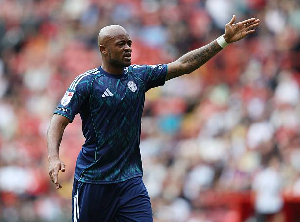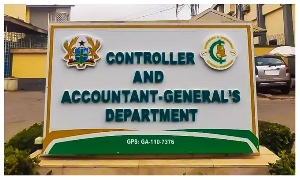I have had the opportunity to read the judgement of the Ghana @50 trial. I have also been following development in Ghana following the judgement, especially the statement made by the NDC party Chairman and discussions thereafter. I am not a legal expert on constitutional matters or criminal law. My legal knowledge is limited to “jus ad bellum, jus in bello”, commonly known as International Humanitarian Law or in the military as International Law of Armed Conflict and the Use of Force. I also have knowledge in UK/EU employment legislation. However, I am disappointed that Ghanaians are making political capital out of this historic judgement. The High Court judgement is an historic judgement for a number of very important reasons that must be debated by all who believe in the rule of law and the development of democracy in Ghana.
First and foremost, the judgement is historic as it is a very positive contribution to the development of case law and possibly, constitutional law in Ghana. This is so because the judgement is strongly grounded in the application and the interpretation of the constitutional origins of Presidential Commissions in Ghana.
Second, it is historic because, the judgement also raises a number of legal and constitutional issues in Ghana that must be addressed with urgency. My understanding from some sections of the judgement was that, two previous trials in Ghana that emanated from Presidential Commissions were unconstitutional since people who appear before such commissions are granted immunity from civil and criminal prosecutions. I have indicated above that my legal knowledge is limited, so please forgive me if my analysis is legally wrong. If the judge’s application or interpretation of the constitution is accurate, then my question is, which courts did the two trials take place? If the trials were at the High Courts, then has the Ghana @50 judgement by a High Court Judge not reviewed the judgements of the High Courts? Assuming my analysis is correct, then can a High Court review and pass judgement on the judgement of another High Court? Is that not a duty reserved for a higher courts (the Appeal or the Supreme Courts)?
Third, the Judge rightly indicated in the judgement that he did not intend to interpret the constitution as that is the prerogative of the Supreme Court. However, a critical analysis of the language used in the judgement suggests that the Judge interpreted Ghana’s constitution. For example, the word “the framers of the constitution” appears on a number of occasions in the judgement when referring to the origins of Presidential Commissions. He then relied on the origins to draw conclusions on what the framers of the constitution meant. That is, those who appear before Presidential Commissions are immune from civil and criminal or any form of prosecution. That was one of the basis of his judgement in favour of the applicants. That also led him to conclude that the trials from the two previous Presidential Commissions were unconstitutional.
From the above, is clear that the Judge was in fact, not only applying or interpreting the law but also interpreting the Constitution. By tracing the constitutional development of Presidential Commissions and drawing inference or concluding on what the framers meant, he interpreted the constitution not applied it by concluding that those two trials were unconstitutional. If I am right (and I stand for correction), the third question is, Does a High Court Judge have the authority to interpret the Constitution? My answer is no, and the Judge actually stated this in his judgement. If I am right, then, the Judge usurped the authority of the Supreme Court. Again, if my conclusion is right, could the judgement allowed to stand even if the Judge’s interpretation is accurate? In my opinion, to avoid the risk of interpreting the constitution, the judge should not have made a conclusive statement that the two trials were unconstitutional but that they were unsafe and therefore should have referred the matter to the Supreme Court for interpretation and a judgement on those trials. The Judge should have also avoided what the framers of the constitution meant, as that is the duty and authority of the Supreme Court.
I am also disappointed about the current debates in Ghana regarding this judgement. First, the debate has shifted onto the negative remarks by the NDC Chairman. His remarks were sad and in fact, naive. Such a personality should know better and to state that his party or government would interfere with the independence of the Judiciary as a means of dealing with the alleged corruption within it questions his understanding of and believe in democratic principles and the rule of law. As a former legislature, he ought to know the roles played by the three arms of governance (the Executive, the Legislature and the Judiciary) and the principles of non-interference. Sadly, the whole debate on the judgement has become a political football between NDC and NPP with each taking entrenched positions. Such positions would not help the development of constitutional and case laws, the rule of law and democracy in Ghana. The Judge has made a very important ruling that could do more good than harm and that is what must be debated by legal experts, law students, the media, political parties, civil society organisations and all stakeholders, instead of entrenched positions purely on party ideological grounds.
The judgement is historic and if this matter goes to Appeal Court and all the way to the Supreme Court, it would be of immense benefit to constitutional law and the development of case law in Ghana.
For those in the NDC and NPP, it is crucial to remember that the rule of law should be devoid of party politics. Though the judgement appears to be victory for NPP supporters, it is also an indictment on the NPP’s belief in the rule of law if it is true that the two trials that took place after Presidential Commissions under the NPP rule were unconstitutional. The NDC also should not regard the judgement as a defeat just because they disagree with the outcome. Instead, the both parties should see it as victory for the rule of law in Ghana. Ghanaians should therefore subject the judgement to critical examination as a way of learning lessons from it. Again, if the NDC is of the strong believe that the judgement is wrong, then the right and appropriate action is for the Attorney General to lodge an appeal at the Appeal Court.
Again, the Judgement contained very important lessons for the present government and future governments. That is, because Presidential Commissions automatically granted immunity to all persons who appeared as witnesses, in future if governments intend to prosecute officials for any wrong doing, then Presidential Commissions should not be the route to identifying such wrong doing. This is a new development in Ghana’s constitutional and judicial history. Previously, the practice has been prosecution after Presidential Commission, despite a change in previous constitutions that made such practices unconstitutional. I believe the previous NPP and the present NDC governments were unaware of this constitutional change. This sadly has led to some people being wrongly tried and convicted in spite of the immunity granted them as constitutional rights. Is that not miscarriage of justice? I am sure if the Kufour and the Ata Mills governments were aware of this constitutional change, they would not have established Presidential Commissions as a means of prosecuting those who were the subject of investigations and or witnesses. This is a big lesson for immediate past, present and future Attorney Generals. If this judgement is not reversed by a higher court/s, then the Judge has made a significant contribution to case law in Ghana.
Another merit in the judgement is the right of appeal after adverse findings are made against individuals by a Presidential Commission. It is not clear from the judgement if those who were tried under the previous government after a Presidential Commissions exercised their rights of appeal at the Appeal Court prior to their trial. If that was not the case, then again, their rights of appeal guaranteed under the constitution were violated by the state. It was very clear from the ruling that Presidential Commissions guaranteed the rights of appeal to those who adverse findings are made against, yet the state through the Attorney General chose to disregard this constitutional right. I am sure this is not the first one and had it not been this judgement, the case in question would not have been the last.
It is also interesting to note that, the retired Judge and Chairman of the Presidential Commission and the members were unaware of the immunity from prosecution and recommended the prosecution of those who adverse findings were made against them. And again, I believe is that, the same was the case of the previous two Presidential Commissions that resulted in prosecution. The lesson from the judgement is that the Commissions acted above their authority and therefore some sections of their recommendations were unconstitutional.
There is another interesting legal issue in the judgement that merits further probing. The Prosecution team referred to the applicants as “subject of the investigation” and not mere witnesses at the Commission. In other words, the immunity did not extend to them as they were subjects of the investigation and not witnesses. The Defence team on the other hand argued to the contrary that the applicants were witnesses and were immune from prosecution. The judge made a ruling on this matter and concluded that they were witnesses who were immune from prosecution. He based his conclusion from the terms of reference of the Presidential Commission. The terms of reference was clear that there was no mention of any individual/s as “subject/s of the commission’s work or investigations”. Does that mean that, had the terms of reference made this specific differentiation and named individual/s who are to appear before Presidential Commissions as subject of the work of the commission, then such individuals would not have been covered by the immunity guaranteed to witnesses? I think this is an area that needs further critical examination as there is the potential for future governments to circumvent the immunity by categorising and defining the types of people who appear before Presidential Commissions in the terms of reference.
These and others are the issues that Ghanaians should be debating among themselves to learn lessons from a landmark judgement in Ghana.
No one will benefit from this judgement (in fact Ghana stands to lose), if the current debate is just about what the NDC and NPP did in the past. For example, I have heard and read about what happened under the governments of Busia and Kufour on the NPP side and those under the Rawlings governments of P/NDC. Though we must not forget such errors in Ghana’s history, references to them in the current debates only widens the gulf between NDC and NPP and would not be of any benefit to NDC, NPP or Ghana. They are only a reminder of the dark side of Ghana’s political history.
There are even allegations of collusion between Judges and politicians and corruption within the Judiciary. Such allegations cut a slur on the Ghana’s image and doubts in the minds of the international community on Ghana’s democratic dispensation. I am not in any way suggesting that if there is corruption within the Judiciary, it should not be openly discussed. However, it is just not right to make allegations without evidence. It is damaging to allege corruption against institutions of governance without taking appropriate steps and actions to address it. Definitely, the action of the NDC Chairman was wrong and inappropriate. At best, it could be regarded as threats, intimidation and indirect interference with the independence of the judiciary.
Having said all the above, I am convinced that Ghanaians are more than able and capable of effectively resolving any issues from the judgement and the outcome of this historic judgement would strengthen democracy, the rule of law as well contribute to the development of constitutional and case law, through the appropriate constitutional mechanisms.
Some of us with interests in Ghana and Africa as a whole are keeping a watching eye on this judgement and subsequent developments. Long live democracy and the rule of law in Ghana.
Kofi Ata, Cambridge, UK
Opinions of Saturday, 21 August 2010
Columnist: Ata, Kofi














